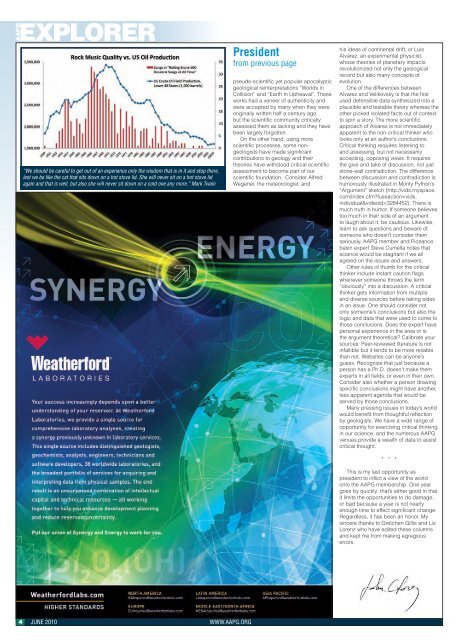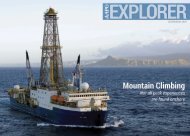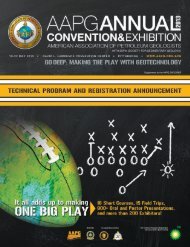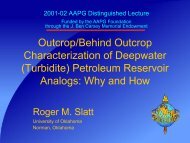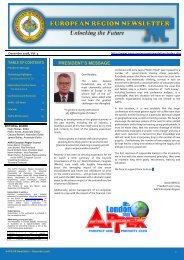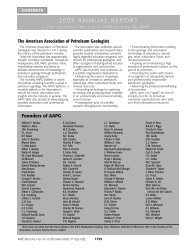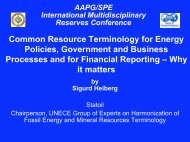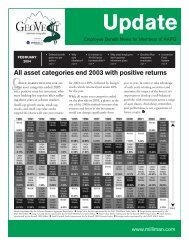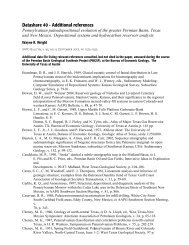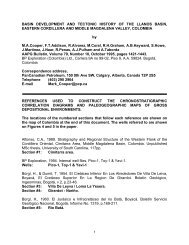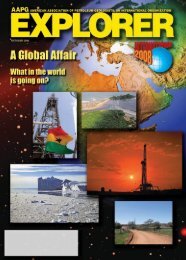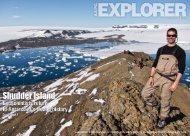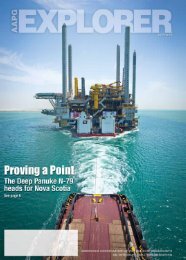AAPG Explorer - June 2010 - American Association of Petroleum ...
AAPG Explorer - June 2010 - American Association of Petroleum ...
AAPG Explorer - June 2010 - American Association of Petroleum ...
You also want an ePaper? Increase the reach of your titles
YUMPU automatically turns print PDFs into web optimized ePapers that Google loves.
<strong>AAPG</strong><br />
EXPLORER<br />
“We should be careful to get out <strong>of</strong> an experience only the wisdom that is in it and stop there,<br />
lest we be like the cat that sits down on a hot stove lid. She will never sit on a hot stove lid<br />
again and that is well, but also she will never sit down on a cold one any more.” Mark Twain<br />
4 JUNE <strong>2010</strong> WWW.<strong>AAPG</strong>.ORG<br />
President<br />
from previous page<br />
pseudo-scientific yet popular apocalyptic<br />
geological reinterpretations “Worlds in<br />
Collision” and “Earth in Upheaval”. These<br />
works had a veneer <strong>of</strong> authenticity and<br />
were accepted by many when they were<br />
originally written half a century ago,<br />
but the scientific community critically<br />
assessed them as lacking and they have<br />
been largely forgotten.<br />
On the other hand, using more<br />
scientific processes, some nongeologists<br />
have made significant<br />
contributions to geology and their<br />
theories have withstood critical scientific<br />
assessment to become part <strong>of</strong> our<br />
scientific foundation. Consider Alfred<br />
Wegener, the meteorologist, and<br />
his ideas <strong>of</strong> continental drift, or Luis<br />
Alvarez, an experimental physicist,<br />
whose theories <strong>of</strong> planetary impacts<br />
revolutionized not only the geological<br />
record but also many concepts <strong>of</strong><br />
evolution.<br />
One <strong>of</strong> the differences between<br />
Alvarez and Velikovsky is that the first<br />
used defensible data synthesized into a<br />
plausible and testable theory whereas the<br />
other picked isolated facts out <strong>of</strong> context<br />
to spin a story. The more scientific<br />
approach <strong>of</strong> Alvarez is not immediately<br />
apparent to the non-critical thinker who<br />
looks only at an author’s conclusions.<br />
Critical thinking requires listening to<br />
and assessing, but not necessarily<br />
accepting, opposing views. It requires<br />
the give and take <strong>of</strong> discussion, not just<br />
stone-wall contradiction. The difference<br />
between discussion and contradiction is<br />
humorously illustrated in Monty Python’s<br />
“Argument” sketch (http://vids.myspace.<br />
com/index.cfm?fuseaction=vids.<br />
individual&videoid=3284452). There is<br />
much truth in humor. If someone believes<br />
too much in their side <strong>of</strong> an argument<br />
to laugh about it, be cautious. Likewise,<br />
learn to ask questions and beware <strong>of</strong><br />
someone who doesn’t consider them<br />
seriously. <strong>AAPG</strong> member and Piceance<br />
basin expert Steve Cumella notes that<br />
science would be stagnant if we all<br />
agreed on the issues and answers.<br />
Other rules <strong>of</strong> thumb for the critical<br />
thinker include instant caution flags<br />
whenever someone throws the term<br />
“obviously” into a discussion. A critical<br />
thinker gets information from multiple<br />
and diverse sources before taking sides<br />
in an issue. One should consider not<br />
only someone’s conclusions but also the<br />
logic and data that were used to come to<br />
those conclusions. Does the expert have<br />
personal experience in the area or is<br />
the argument theoretical? Calibrate your<br />
sources: Peer-reviewed literature is not<br />
infallible but it tends to be more reliable<br />
than not. Websites can be anyone’s<br />
guess. Recognize that just because a<br />
person has a Ph.D. doesn’t make them<br />
experts in all fields, or even in their own.<br />
Consider also whether a person drawing<br />
specific conclusions might have another,<br />
less apparent agenda that would be<br />
served by those conclusions.<br />
Many pressing issues in today’s world<br />
would benefit from thoughtful reflection<br />
by geologists. We have a wide range <strong>of</strong><br />
opportunity for exercising critical thinking<br />
in our science, and the numerous <strong>AAPG</strong><br />
venues provide a wealth <strong>of</strong> data to assist<br />
critical thought.<br />
* * *<br />
This is my last opportunity as<br />
president to inflict a view <strong>of</strong> the world<br />
onto the <strong>AAPG</strong> membership. One year<br />
goes by quickly: that’s either good in that<br />
it limits the opportunities to do damage,<br />
or bad because a year is not nearly<br />
enough time to effect significant change.<br />
Regardless, it has been an honor. My<br />
sincere thanks to Gretchen Gillis and Liz<br />
Lorenz who have edited these columns<br />
and kept me from making egregious<br />
errors.


